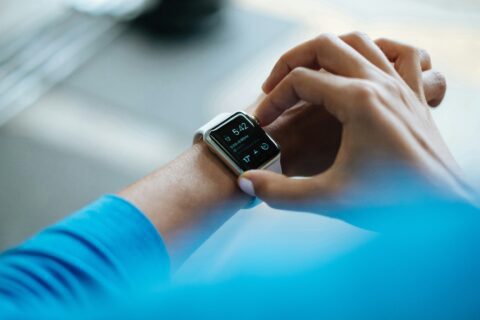Introduction to Smartphones and Smartwatches
Welcome to the battle of the tech titans – smartphones versus smartwatches! In this fast-paced digital era, it’s no surprise that we’re constantly seeking smarter and more convenient gadgets to enhance our lives. While smartphones have been ruling the roost for quite some time now, smartwatches are making their mark as a formidable contender in the realm of technology companions. So, which device truly reigns supreme? Join us on this exhilarating journey as we explore the features, functions, and benefits offered by both these innovative devices. Whether you’re an early adopter or simply curious about what lies ahead in the world of wearable tech, this article will quench your thirst for knowledge. So buckle up and let’s dive into the fascinating universe where smartphones collide with wrist-worn wonders!
The Evolution of Smartphones and Smartwatches
The evolution of smartphones and smartwatches has been nothing short of remarkable. Over the years, these devices have transformed from simple communication tools to powerful mini-computers that we carry with us everywhere.
Smartphones, first introduced in the early 2000s, revolutionized the way we communicate and access information. They quickly became a necessity for most people, offering features like internet browsing, email access, and multimedia capabilities. As technology advanced, so did smartphones – they became faster, sleeker, and more feature-packed.
On the other hand, smartwatches emerged as a wearable technology in the past decade. Initially viewed as an extension of smartphones on our wrists, they have since evolved into standalone devices with their own set of unique functionalities. Smartwatches now offer health tracking features like heart rate monitoring and sleep tracking.
In terms of design and form factor, smartphones have become larger with bigger displays to enhance media consumption and productivity. Conversely, smartwatches have become smaller yet more stylish and customizable to suit individual preferences.
Both devices continue to push boundaries when it comes to convenience and accessibility. While smartphones provide a larger screen real estate for tasks like web browsing or watching videos on-the-go; smartwatches excel at providing quick glances at notifications without having to take your phone out every time.
When it comes to health and fitness tracking capabilities though both devices are capable enough – be it counting steps or measuring heart rate- smartwatches tend to have an edge due their constant presence on our wrists which encourages wearers towards healthier lifestyles.
Battery life remains one area where there is still room for improvement for both gadgets but given that phones are power-hungry beasts accommodating large batteries can limit user experience whereas limited battery capacity has restricted continuous usage options on Smart Watches making them charge dependent companions rather than being autonomous ones
Price-wise there’s no denying that smartphones generally come with heftier price tags compared to their wrist-worn counterparts. However, it’s important to consider the functionality and versatility that
Features and Functions
Smartphones and smartwatches have become an integral part of our lives, offering a wide range of features and functions that cater to various needs. From communication to entertainment, these devices have revolutionized the way we interact with technology.
When it comes to features, smartphones take the lead with their larger screens and extensive capabilities. They offer a multitude of apps for productivity, social media, gaming, and more. With a smartphone in your pocket, you can browse the internet, watch videos on the go, capture stunning photos with high-quality cameras, and even edit them using advanced editing tools.
On the other hand, smartwatches may be smaller in size but don’t underestimate their functionalities. They provide quick access to notifications from your phone without having to take it out of your pocket or bag. You can check messages, answer calls (in some models), track your steps throughout the day for fitness purposes or monitor your heart rate during exercise sessions.
Both smartphones and smartwatches now come equipped with voice assistants like Siri or Google Assistant for hands-free operation. This feature enables users to dictate texts or ask questions without needing to type or tap on small screens constantly.
Moreover , smartphones usually offer more storage space than smartwatches – allowing you to store all your favorite music tracks offline as well as download large files if needed .
While smartphones offer a wider array of features due mainly because they are larger devices capable of handling more sophisticated software applications , smartwatches excel at providing convenient access to important information on-the-go . So whether it’s about convenience or functionality , choosing between a smartphone and a smartwatch ultimately depends on individual preferences and lifestyle requirements . Regardless if one is chosen over another both bring added value into everyday life by making tasks simpler through variety of different ways !
Convenience and Accessibility
Convenience and accessibility are two key factors to consider when choosing between a smartphone and a smartwatch. Smartphones offer a wide range of features and functions, but they can be cumbersome to carry around all the time. On the other hand, smartwatches are lightweight and easily worn on the wrist, making them a more convenient option.
With a smartphone, you have access to a large screen that allows for easy browsing and viewing of content. However, this also means that you need both hands free to operate it effectively. Smartwatches, on the other hand, have smaller screens but are designed for quick glances and simple interactions. They allow you to stay connected without having to dig your phone out of your pocket or bag.
In terms of accessibility, smartphones may require you to unlock them with passcodes or fingerprints before use. This can be time-consuming and inconvenient in certain situations. Smartwatches often come with features like touchscreens or voice commands that provide seamless interaction without any additional steps.
Moreover, smartwatches offer quick access to notifications such as calls, messages, emails, and social media updates right from your wrist. You don’t need to constantly check your phone; instead, important information is readily available at a glance.
Convenience and accessibility greatly depend on personal preference and lifestyle factors. While smartphones excel in offering an extensive range of functionalities on larger screens, smartwatches provide instant access in a compact form factor – ideal for those who prioritize ease-of-use while staying connected throughout their day.
Health and Fitness Tracking
Health and Fitness Tracking is an integral feature of both smartphones and smartwatches, but the way they approach it differs. Smartphones offer a wide range of health tracking apps that can monitor steps taken, calories burned, and even track sleep patterns. They provide a comprehensive overview of your fitness progress, allowing you to set goals and analyze your performance over time.
On the other hand, smartwatches take this functionality a step further by offering real-time monitoring directly on your wrist. With built-in heart rate sensors and GPS capabilities, they provide accurate data during workouts or daily activities. Some models even include features like ECG readings and blood oxygen level monitoring.
The convenience factor plays a significant role here as well. While smartphones require you to carry them in your pocket or armband during exercise sessions, smartwatches stay securely strapped to your wrist throughout the day. This means you can effortlessly track every step you take without worrying about misplacing or dropping your phone.
Moreover, smartwatches often come with dedicated fitness apps that offer customized workout plans based on individual goals and preferences. These apps also send reminders to get up and move if you’ve been sitting for too long – perfect for those who lead sedentary lifestyles or have desk jobs!
In terms of accuracy, both smartphones and smartwatches generally deliver reliable results when it comes to basic metrics like steps taken or distance covered. However, some argue that wearable devices such as smartwatches provide more precise heart rate monitoring due to their direct contact with the skin.
In conclusion (remember not to use these words!), whether you prefer using a smartphone or a smartwatch for health tracking ultimately depends on personal preference and lifestyle factors. If you’re someone who enjoys intense workouts or wants continuous access to real-time data while staying hands-free during exercise sessions, then investing in a high-quality smartwatch might be the right choice for you!
Battery Life and Durability
When it comes to choosing the ultimate tech companion, battery life and durability are two crucial factors to consider. Smartphones have come a long way in terms of battery technology, with many models boasting all-day usage or even multi-day power. However, despite these advancements, there are still instances when your smartphone can die at the most inconvenient times.
On the other hand, smartwatches generally have smaller batteries but require less power due to their smaller screens and limited functionality. This means that they often last longer between charges compared to smartphones. With a smartwatch on your wrist, you won’t have to worry about running out of battery during important meetings or outdoor activities.
Durability is another aspect where smartwatches shine. Most smartwatches feature rugged designs and materials that can withstand daily wear and tear. They are built to be water-resistant or even waterproof which makes them suitable for various environments like gyms or swimming pools.
Smartphones also offer durable options like waterproof models but are more prone to accidental damage due to their larger size and delicate screens. Dropping a smartphone can result in cracked displays or damaged internal components.
While both smartphones and smartwatches have made strides in improving battery life and durability over the years, it ultimately boils down to personal preference and lifestyle factors. If you rely heavily on apps, media consumption, and large screen sizes then a smartphone may be your go-to device. On the other hand, if you value convenience, fitness tracking features,and having a reliable tech companion on-hand throughout the day without worrying about charging frequently – then investing in a durable smartwatch might be the right choice for you!
Comparison of Prices
When it comes to choosing between a smartphone and a smartwatch, one important factor to consider is the price. Smartphones generally have a wider range of prices, depending on the brand, model, and features. You can find budget-friendly options as well as high-end flagship devices that come with hefty price tags.
On the other hand, smartwatches tend to be more limited in terms of pricing options. While there are some affordable models available, if you’re looking for advanced features and premium design, you may need to invest in a higher-priced option.
It’s also worth noting that smartphones often require additional expenses such as monthly data plans or contracts with service providers. On the contrary, most smartwatches rely on being paired with a smartphone for full functionality without any added costs.
Your decision will depend on your budget and priorities. If you’re willing to spend more for a versatile device that can do it all and offers multitasking capabilities like browsing the internet or editing documents on-the-go, then a smartphone might be your best bet. However, if you prefer something more streamlined and focused on health tracking or receiving notifications directly on your wrist without breaking the bank, then a smartwatch could be an excellent companion.
In conclusion (without explicitly saying so), both smartphones and smartwatches offer different pricing options depending on their respective features and functionalities
Personal Preference and Lifestyle Factors
Personal Preference and Lifestyle Factors
When it comes down to choosing between a smartphone and a smartwatch as your ultimate tech companion, personal preference and lifestyle factors play a crucial role. Both devices offer unique features and functions that cater to different needs.
For those who heavily rely on their smartphones for work-related tasks, media consumption, gaming, or photography, the smartphone will likely be the preferred choice. The larger screen size allows for better visibility and ease of use when performing various tasks. Additionally, the extensive app ecosystem available on smartphones provides limitless possibilities for customization and productivity.
On the other hand, if you lead an active lifestyle or prioritize health and fitness tracking, then a smartwatch might be more suitable. Smartwatches are designed with built-in sensors that can monitor heart rate, track steps taken throughout the day, measure sleep quality, and even provide personalized workout routines. With notifications conveniently displayed on your wrist without needing to reach for your phone constantly, staying connected becomes effortless during workouts or while on-the-go.
It boils down to individual preferences and needs. Some people may find value in having both devices complement each other’s functionalities. For example, using a smartphone primarily for work-related tasks while relying on a smartwatch for fitness tracking purposes.
In conclusion (without explicitly stating it), there is no definitive answer as to which device is the ultimate tech companion – it all depends on how you intend to use them based on your personal preferences and lifestyle factors. So whether you choose a smartphone or opt for a smartwatch (or maybe even both!), embrace technology that enhances your daily life in ways that suit you best!







